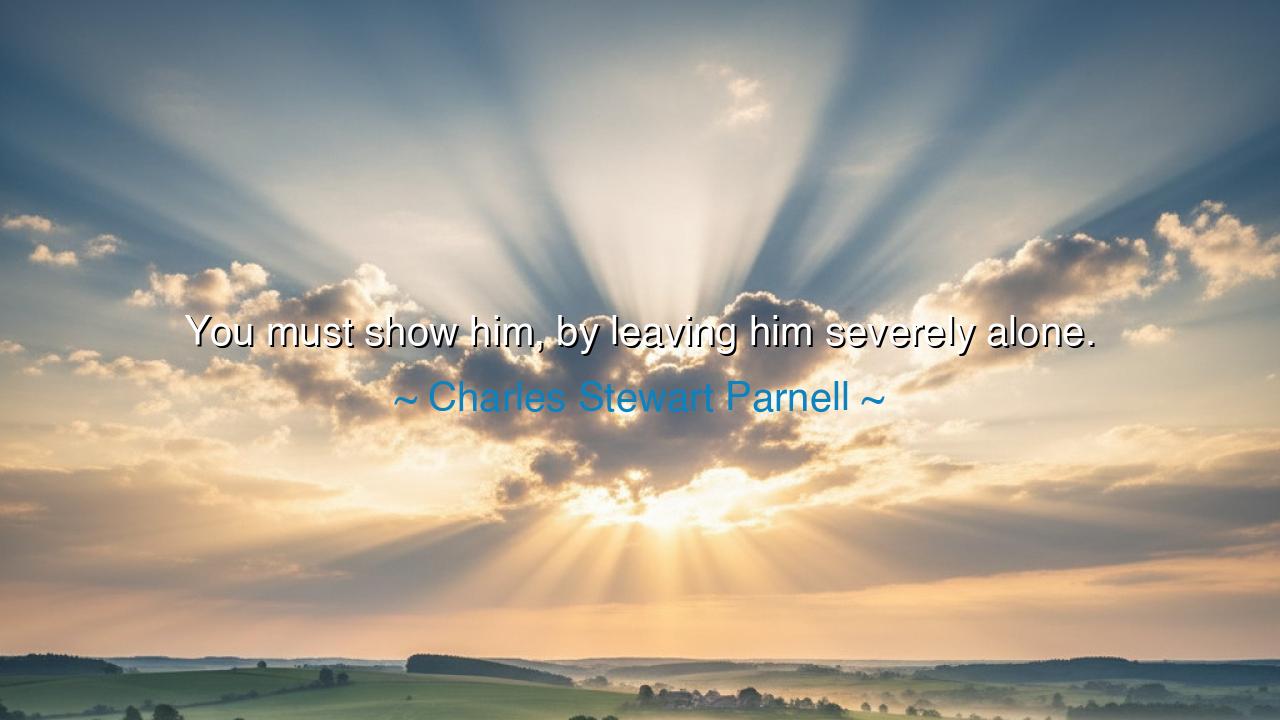
You must show him, by leaving him severely alone.






“You must show him, by leaving him severely alone.” — Thus spoke Charles Stewart Parnell, the great Irish statesman and leader, whose voice once moved nations and stirred the hearts of men toward freedom. His words, sharp and measured, carry a wisdom that transcends their moment in time. They speak not only of political strategy, but of human nature, of power, pride, and the strange potency of silence. For there are moments when confrontation weakens, when argument feeds the very fire it seeks to quench — and the highest form of reproof is withdrawal. To “leave him severely alone” is to master the art of restraint, to show strength not by attack, but by the stillness of one who no longer needs to fight.
The origin of this quote lies in the crucible of Irish politics in the late nineteenth century. Parnell, known as “The Uncrowned King of Ireland,” led the struggle for Home Rule — the dream of self-governance under British rule. He was admired, even revered, by his people. Yet when scandal struck his life, he found himself betrayed by allies, judged by enemies, and condemned by the moral guardians of his age. It was in such a world, fraught with rivalry and ambition, that Parnell understood the deeper currents of human behavior. To engage an opponent directly was often to give them power; to ignore them utterly was to make them vanish into irrelevance. His words were not born from bitterness, but from insight — a recognition that neglect can often accomplish what anger cannot.
This principle is as old as civilization itself. The ancient Stoics taught that one cannot control others — only one’s own reactions to them. To “leave him alone” is to withdraw the fuel that feeds conflict. When one refuses to respond to provocation, the fire dies in its own emptiness. Epictetus, the slave-turned-philosopher, once said that “no man is free who is not master of himself.” So too does Parnell’s teaching urge mastery: to show dignity in the face of insult, to rise above quarrel, to let silence speak where words would only debase. In the realm of politics, as in life, there are times when withdrawal is the greatest display of authority — the majesty of calm.
History gives us many examples of this silent strength. Consider George Washington, who after leading his armies to victory and his people to liberty, chose not to seize power but to step aside, returning quietly to private life. In that act of withdrawal, he taught more about leadership than in all his years of command. He showed that true power lies not in domination, but in self-restraint. The world watched and learned that silence, when guided by wisdom, can speak louder than a thousand speeches. So too did Parnell know that sometimes to leave a man “severely alone” is to reveal his weakness — to let him face the emptiness of his own pride without the mirror of opposition.
But let us not mistake withdrawal for cowardice. To remain silent requires strength; to step back, when anger demands to strike, requires courage. The fool lashes out to prove his might, but the wise wait and watch, knowing that time exposes all things. When Parnell said, “You must show him,” he did not mean to abandon justice, but to wield the weapon of indifference — to deny one’s opponent the dignity of conflict. To ignore what is unworthy is to declare that it has no power to disturb your peace. In this, silence becomes not surrender, but victory — the sovereignty of the composed soul.
Yet there is also compassion hidden in Parnell’s counsel. To “leave him severely alone” is not merely punishment; it is also mercy. It allows the other to confront himself, to wrestle with his conscience without interference. Words may wound or harden, but solitude has a way of softening pride. When one is left alone with one’s own actions, the echo of conscience grows louder. Thus, what seems harsh may in truth be redemptive — the space for self-recognition and renewal.
Therefore, let this be the lesson: not every battle is won by struggle, nor every victory by sound. Learn to recognize when silence is stronger than speech, when withdrawal is wiser than engagement. Do not cast your energy upon those who thrive on conflict; do not feed the vanity of those who seek your reaction. Show them — by calm, by dignity, by distance — that their storm cannot shake your peace. In your own life, when confronted by folly, deceit, or malice, remember Parnell’s wisdom: the most eloquent rebuke may be no rebuke at all.
For the ancients knew, and the wise have always remembered, that there is no greater authority than composure, no greater strength than stillness. Leave the unworthy “severely alone,” and in the quiet that follows, their own noise will undo them. In that silence, you will find not only victory, but freedom — the freedom of one who no longer needs to prove what time and truth will always reveal.






AAdministratorAdministrator
Welcome, honored guests. Please leave a comment, we will respond soon